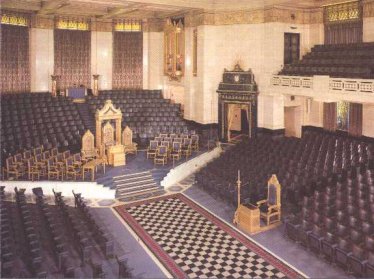
One of the spurious charges against Freemasonry involves the charge that because certain Masonic buildings are called "Temples", there's obviously false religious worship occurring. Nothing could be further from the truth.
 The
use of this word comes into Masonry from two sources: the first involves the
symbols and history of the organization which uses as an example of the Mason's
art, the building of King Solomon's Temple. The second comes from prior English
usage of the word "temple" as a place of learning such as "Temple of Education"
although such terminology is now lost in the 21st century. The term seems far
more exhaustively used in the United States than in other countries and thus
attracts the attention of religious intolerants.
The
use of this word comes into Masonry from two sources: the first involves the
symbols and history of the organization which uses as an example of the Mason's
art, the building of King Solomon's Temple. The second comes from prior English
usage of the word "temple" as a place of learning such as "Temple of Education"
although such terminology is now lost in the 21st century. The term seems far
more exhaustively used in the United States than in other countries and thus
attracts the attention of religious intolerants.
Like other ill-conceived rants against Freemasonry, this one merely shows the ignorance of the accuser. While some buildings are indeed awe-inspiring, particularly when filled with good men with whom a common purpose is shared, no Mason would ever assume that he was entering a 'solemn place of worship' for the purpose of worshipping.
In order to stem the complaints of those whose education in the development and usage of the language is limited or those who might unknowingly be seduced by Masonic detractors, many Grand Lodges throughout the US are now changing their description of buildings used by Masons to "Masonic Hall" or "Masonic Building" rather than "Masonic Temple". Nevertheless, this spurious claim will undoubtedly continue to haunt at the fringe of complaints made by a vocal few.
Above: Freemason's Hall, London, UK
|
Related Topics: |
|
In addition, |